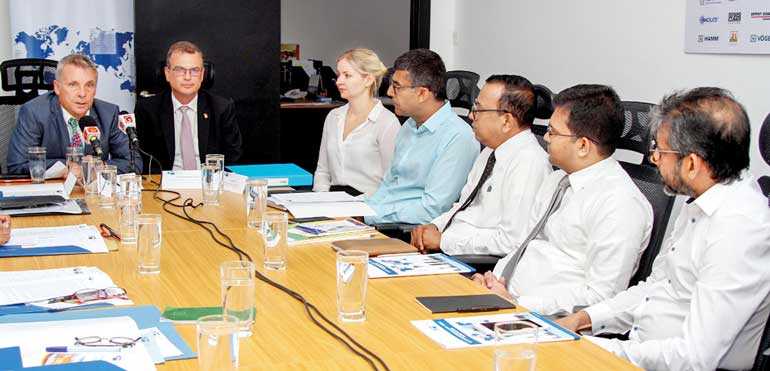Wednesday Feb 18, 2026
Wednesday Feb 18, 2026
Thursday, 7 March 2019 00:00 - - {{hitsCtrl.values.hits}}


The Delegation of German Industry and Commerce in Sri Lanka (AHK Sri Lanka) launched the first AHK-VET Council with representatives of different business sectors and VET authorities in presence of the German Ambassador Jörn Rohde yesterday.
The VET Council is an essential instrument to certify vocational training according to German standards and is an initiative to contribute to the strengthening of demand- and industry-driven Vocational Education and Training (VET) in Sri Lanka.
Chief Delegate of German Industry and Commerce in Sri Lanka (AHK Sri Lanka), Andreas Hergenröther, highlighted that the high standards of vocational training in Germany contributed essentially to the high competitiveness of German companies. VET Councils as central platforms for the industry are of utmost importance because they ensure a continuously demand-oriented development of the dual vocational training.
Evidently, figures from Germany show that dual vocational education has been a key factor of success for the economic development. The country has the largest national economy in Europe and the fourth-largest by nominal GDP in the world. Demand-driven dual vocational training in Germany has conducted to the lowest youth unemployment rate in Europe. Yet, the German economy invests annually € 27 billion in vocational training and the German Government € 3 billion.
Approximately 500,000 companies provide training in Germany for 1.5 million trainees, which represent 60% of the school graduates. Most of the trainees take up a position at that same company afterwards, where they benefit from being trained in the exact field of their work.
The apprenticeships in Germany consist of two-third in-company training and one-third at public VET schools. Training contracts are concluded between the trainee and the training company. Dual vocational training gives apprentices a chance to learn practically what is demanded by the industry and provides the training company with the chance to train the apprentices exactly according to their needs.
As a platform for the Sri Lankan industry and with vocational education affiliated institutions, the VET Council discusses Vocational Education and Training (VET) and develops suitable approaches in order to improve its quality by formulating needs, adopting resolutions, and recommending a suitable course of action to the official governmental VET representatives. It also plays a crucial role to ensure the quality standards as well as the transparency for certifying vocational training programmes according to German standards. Its members are companies engaged in VET, vocational education school trainers and in-company trainers, as well as representatives from official VET authorities.
German Ambassador Jörn Rohde emphasised on the need of cooperation in the field of dual vocational education instead of competing with each other, noting that work has to be done from the industry for the industry by joining hands with all relevant actors involved.
Currently, AHK Sri Lanka certifies the Automobile Mechatronics three-year course offered by DIMO Academy for Technical Skills (DATS). For the future it is planned to extend these certifying activities which guarantee that German standards are kept in regard to quality assurance, transparency and competitiveness. Founding members of the VET Council are DIMO, Würth Lanka, Mercmarine, CINEC, Chamber of Construction Industry, Fairway Waste Management, Leema Creations Ltd. Interiors and Tudawe Brothers as well as TVEC and VTA. For the future, VET Council sessions are planned on a regular basis. The Council counts on the active involvement and engagement of its members, since it is an industry-driven approach as Manager Public Projects and Vocational Training Lucy Schulze pointed out.
The Delegation of German Industry and Commerce in Sri Lanka (AHK Sri Lanka) is part of the German Chamber Network abroad of more than 140 offices around the world. The Delegations of German Industry and Commerce represent the interests of German businesses in their partner countries. One interest of a fruitful and sustainable bilateral cooperation is vocational education and training.
Pix by Chamila Karunaratne